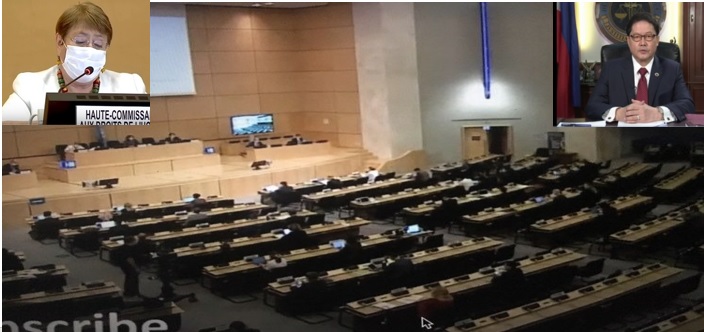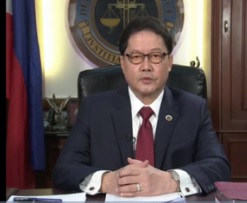
Participation to the 44th session of the UN Human Rights Council was mostly online. Inset photo on the left is UN High Commissioner of Human Rights Michelle Bachelet. Inset photo on the right is Philippine Justice Secretary Menardo Guevarra.
During the last two and a half decades, I have been travelling to the Palais des Nations in Geneva to participate in human rights sessions, deliver interventions, and lobby states on human rights concerns.I would never have believed that I should see the UN session hall almost empty as it was during the 44th session of the UN Human Rights Council (UNHRC), which opened on 30th June 2020.Participation was online due to the COVID-19 pandemic.
The Republic of the Philippines, one of the founding members of the United Nations, was yet again subjected to international scrutiny at the outset of the 44th session.The UN High Commissioner of Human Rights said that according to her office’s report the Philippine situation is “near impunity.” This from the first female Chilean president, Michelle Bachelet, a woman who survived torture during the Pinochet dictatorship: she was referring to Philippine laws and policies directed at the drugs business and threats to national security, whose implementation has led to the killing of 248 human rights defenders – lawyers, journalists, trade unionists – between 2015 and 2019.
So loud and so clear was the call of the High Commissioner asking President Duterte to refrain from signing the Philippines’09 new Anti-Terrorism bill.She further offered the assistance of her office in reviewing this draft legislation.Yet barely a week after the start of the UNHRC session, the bill has already been signed into law, on 3 July 2020. This draconian law, which introduces warrantless arrests among other curtailments of fundamental freedoms, is vehemently opposed by civil society.The government of one of the first three states to sign the United Nations’ 1942 Declaration refused to listen.
The UNHRC is an inter-governmental body composed of 47 States responsible for advancing human rights. It replaced the UN Commission on Human Rights in 2006 as the watchdog of the member-states’ observance of human rights. The Philippines was one of the first states to support the UNHRC’s establishment and was one of its founding members.It periodically reapplies for continuing membership – but still has to prove itself worthy of its place in this august body.
At the 44th session, members of the European Union, part of the Western European and Other Groups, expressed profound concern about the direction of the Philippines, emphasizing the consequences for human rights of the Duterte administration’s “war on drugs” and censuring its failure to implement recommendations made during the Philippines’ Third Cycle of the Universal Periodic Review.
ASEAN on the other hand, and other members of the Asia and the Pacific Group, as well as some states in other regions such as Venezuela, Cuba and Belarus, expressed their unequivocal support for the Philippines, noting in particular its collaboration with the UNHRC, its robust NGO community and its efforts in reducing poverty.China conspicuously praised the Philippines’ progress in human rights.Like the Philippines, many of these states were reprehended for their negative human rights records during the Universal Periodic Review.Their interventions on the Philippines were informed by geographical groupings and their own interests rather than the real situation, while States with a record of protecting human rights are horrified by the Philippine government’s appalling human rights situation.
Philippine non-government organizations (NGOs) condemned their country’s withdrawal from the International Criminal Court; the arrest and detention of Maria Ressa; the endless implementation of extrajudicial executions; the shutdown of the largest television network, ABS-CBN; continuing enforced disappearances and torture; the red-tagging of Sister Mary John Mananzan OSB and of a number of NGOs; the shoot-to-kill order against COVID-19 lockdown violators; and the then-imminent enactment of what is now the 2020 Anti-Terror Law.
Towing President Duterte’s line, Justice Secretary Menardo Guevarra responded that transparency and constructive cooperation characterized the country’s engagement with the UN, while the Philippine Commission on Human Rights, which Duterte tried to eliminate in 2018 by giving it a budget of PhP 1,000 ($20), asserted the vital importance of accountability.Commissioner Karen Dumpit said that the past failure to protect human rights had directly led to the current climate of impunity, and there was an obligation on the Government to pursue social justice and uphold human rights.
The Philippines prides itself as a founding member of the community of nations, though to become a model of human rights promotion and defense remains a distant hope. The UN, as a non-prosecutory body, powerfully sanctions States through international shame.
Shame is such a lonely word.
*Mary Aileen D. Bacalso is former secretary-general of the Asian Federation Against Involuntary Disappearances.For her work against enforced disappearances, the Argentinian Government conferred on her the Emilio F. Mignone International Human Rights Prize in 2013, and she was awarded the 2019 Franco-German Ministerial Prize for Human Rights and the Rule of Law.
